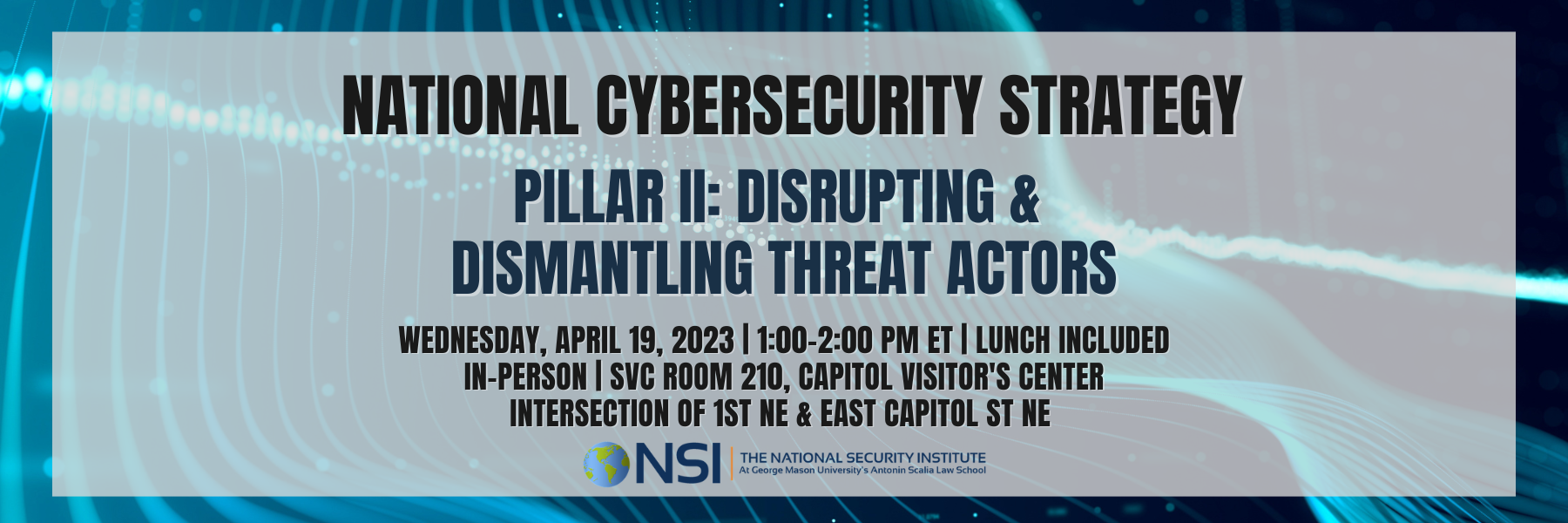The Biden-Harris National Cybersecurity Strategy | Pillar II: Disrupt & Dismantle Threat Actors
Date: Wednesday, April 19, 2023
Time: 1:00-2:00 pm | Lunch Included
Location: Senate Visitor’s Center, SVC Room 210
Intersection of 1st ST NE & East Capitol ST NE
Register Here!
The Biden-Harris Administration released the 2023 National Cybersecurity Strategy to coordinate national cybersecurity efforts, and specifically on disrupting and dismantling malicious actors. This event examined how this strategy will integrate all instruments of U.S. national power from legislative, executive, and diplomatic to military, the intelligence community, and the private sector to thwart malicious cyber actors that seek to undermine the United States’ national cybersecurity. Key themes of the discussion included:
- National resource and policy coordination to thwart threat actors;
- Policies to advance U.S. infrastructure protection, and public-private partnership;
- Collaborative efforts to streamline intelligence sharing; and
- Public and private roles and responsibilities related to national cyber defense.
Learn more about NSI’s new Cyber and Tech Center here.
 Laura Galante: Laura Galante is the Cyber Executive and Director of the Cyber Threat Intelligence Integration Center (CTIIC) for the Office of the Director for National Intelligence. In this role, Ms. Galante is responsible for driving a coordinated approach to cyber intelligence collection and analysis, aligning strategic investments with national security priorities, and leading intelligence efforts to respond to major cybersecurity incidents. From 2017 to 2021, she assisted multiple Ukrainian government agencies to improve their cyber defense operations, directed an international task force to monitor cyber and information threats to Ukraine’s 2019 presidential election, and served as an expert witness in multiple cyber warfare trials. Ms. Galante was previously the Director of Global Intelligence at Mandiant (formerly FireEye Inc.), the cybersecurity firm. Her team discovered and attributed multiple state and criminal cyber operations, including the Russian military’s “APT28.” Prior to her role at Mandiant, Ms. Galante served at the Defense Intelligence Agency where she led a team responsible for analyzing Russian cyber capabilities. Ms. Galante holds a B.A. in Foreign Affairs and Italian from the University of Virginia and a J.D. from the Catholic University of America. She is a Term Member of the Council on Foreign Relations and a former Senior Fellow at the Atlantic Council.
Laura Galante: Laura Galante is the Cyber Executive and Director of the Cyber Threat Intelligence Integration Center (CTIIC) for the Office of the Director for National Intelligence. In this role, Ms. Galante is responsible for driving a coordinated approach to cyber intelligence collection and analysis, aligning strategic investments with national security priorities, and leading intelligence efforts to respond to major cybersecurity incidents. From 2017 to 2021, she assisted multiple Ukrainian government agencies to improve their cyber defense operations, directed an international task force to monitor cyber and information threats to Ukraine’s 2019 presidential election, and served as an expert witness in multiple cyber warfare trials. Ms. Galante was previously the Director of Global Intelligence at Mandiant (formerly FireEye Inc.), the cybersecurity firm. Her team discovered and attributed multiple state and criminal cyber operations, including the Russian military’s “APT28.” Prior to her role at Mandiant, Ms. Galante served at the Defense Intelligence Agency where she led a team responsible for analyzing Russian cyber capabilities. Ms. Galante holds a B.A. in Foreign Affairs and Italian from the University of Virginia and a J.D. from the Catholic University of America. She is a Term Member of the Council on Foreign Relations and a former Senior Fellow at the Atlantic Council.
 Neal Higgins: Neal Higgins is the Deputy National Cyber Director for National Cybersecurity at the Office of the National Cyber Director. Previously, he served as the CIA’s Associate Deputy Director for Digital Innovation, responsible for CIA’s cyber operations, open-source collection, data science, and secure global communications. Neal also served as CIA’s Director of Congressional Affairs and as deputy chief of the WikiLeaks Task Force. Before joining CIA, Neal served in several senior staff roles in the United States Senate and worked as an editor at Foreign Affairs and as a member of the trial team prosecuting Slobodan Milosevic. Neal is a graduate of Princeton University, Harvard Law School, and the Fletcher School of Law & Diplomacy.
Neal Higgins: Neal Higgins is the Deputy National Cyber Director for National Cybersecurity at the Office of the National Cyber Director. Previously, he served as the CIA’s Associate Deputy Director for Digital Innovation, responsible for CIA’s cyber operations, open-source collection, data science, and secure global communications. Neal also served as CIA’s Director of Congressional Affairs and as deputy chief of the WikiLeaks Task Force. Before joining CIA, Neal served in several senior staff roles in the United States Senate and worked as an editor at Foreign Affairs and as a member of the trial team prosecuting Slobodan Milosevic. Neal is a graduate of Princeton University, Harvard Law School, and the Fletcher School of Law & Diplomacy.
 Matthew Olsen: Matt Olsen is the Assistant Attorney General for National Security. He leads the Department of Justice’s mission to combat terrorism, espionage, cybercrime, and other threats to national security. From 2011 to 2014, Olsen served as the Director of the National Counterterrorism Center. Prior to leading NCTC, Olsen was the General Counsel for the National Security Agency. He also served as an Associate Deputy Attorney General for national security and was Special Counselor to the Attorney General. In 2006, Olsen helped establish the National Security Division and served as the first career Deputy Assistant Attorney General for National Security. He also served as Special Counsel to the Director of the Federal Bureau of Investigation, supporting the post-9/11 transformation of the FBI. He graduated from Harvard Law School and the University of Virginia.
Matthew Olsen: Matt Olsen is the Assistant Attorney General for National Security. He leads the Department of Justice’s mission to combat terrorism, espionage, cybercrime, and other threats to national security. From 2011 to 2014, Olsen served as the Director of the National Counterterrorism Center. Prior to leading NCTC, Olsen was the General Counsel for the National Security Agency. He also served as an Associate Deputy Attorney General for national security and was Special Counselor to the Attorney General. In 2006, Olsen helped establish the National Security Division and served as the first career Deputy Assistant Attorney General for National Security. He also served as Special Counsel to the Director of the Federal Bureau of Investigation, supporting the post-9/11 transformation of the FBI. He graduated from Harvard Law School and the University of Virginia.
 Iranga Kahangama: Iranga Kahangama is the Assistant Secretary for Cyber, Infrastructure, Risk, and Resilience at the Department of Homeland Security. Previously, he served at the White House in the National Security Council as Director for Cyber Incident Response. In that role, he was the principal author of Executive Order 14028, Improving the Nation’s Cybersecurity. He also oversaw the Federal Government’s response to a wide range of malicious cyber activity, including the Russia-attributed SolarWinds incident, China’s exploitation of Microsoft Exchange servers, and ransomware attacks on Colonial Pipeline, JBS Foods, and Kaseya Software. Prior to the NSC, he served as a senior policy advisor at the FBI, working on an array of cyber, internet, and technology policy issues. This included leading the FBI’s program on internet governance, where he was part of the US delegation to various internet governance forums including the Internet Corporation for Assigned Names and Numbers (ICANN). He earned a Master of Public Policy from the Harvard Kennedy School of Government.
Iranga Kahangama: Iranga Kahangama is the Assistant Secretary for Cyber, Infrastructure, Risk, and Resilience at the Department of Homeland Security. Previously, he served at the White House in the National Security Council as Director for Cyber Incident Response. In that role, he was the principal author of Executive Order 14028, Improving the Nation’s Cybersecurity. He also oversaw the Federal Government’s response to a wide range of malicious cyber activity, including the Russia-attributed SolarWinds incident, China’s exploitation of Microsoft Exchange servers, and ransomware attacks on Colonial Pipeline, JBS Foods, and Kaseya Software. Prior to the NSC, he served as a senior policy advisor at the FBI, working on an array of cyber, internet, and technology policy issues. This included leading the FBI’s program on internet governance, where he was part of the US delegation to various internet governance forums including the Internet Corporation for Assigned Names and Numbers (ICANN). He earned a Master of Public Policy from the Harvard Kennedy School of Government.
 Jamil N. Jaffer (Moderator): Jamil N. Jaffer is the founder and executive director of the National Security Institute at George Mason University’s Antonin Scalia Law School. He previously served as chief counsel and senior adviser to the Senate Foreign Relations Committee and, among other roles, as an associate counsel to President George W. Bush in the White House.
Jamil N. Jaffer (Moderator): Jamil N. Jaffer is the founder and executive director of the National Security Institute at George Mason University’s Antonin Scalia Law School. He previously served as chief counsel and senior adviser to the Senate Foreign Relations Committee and, among other roles, as an associate counsel to President George W. Bush in the White House.

